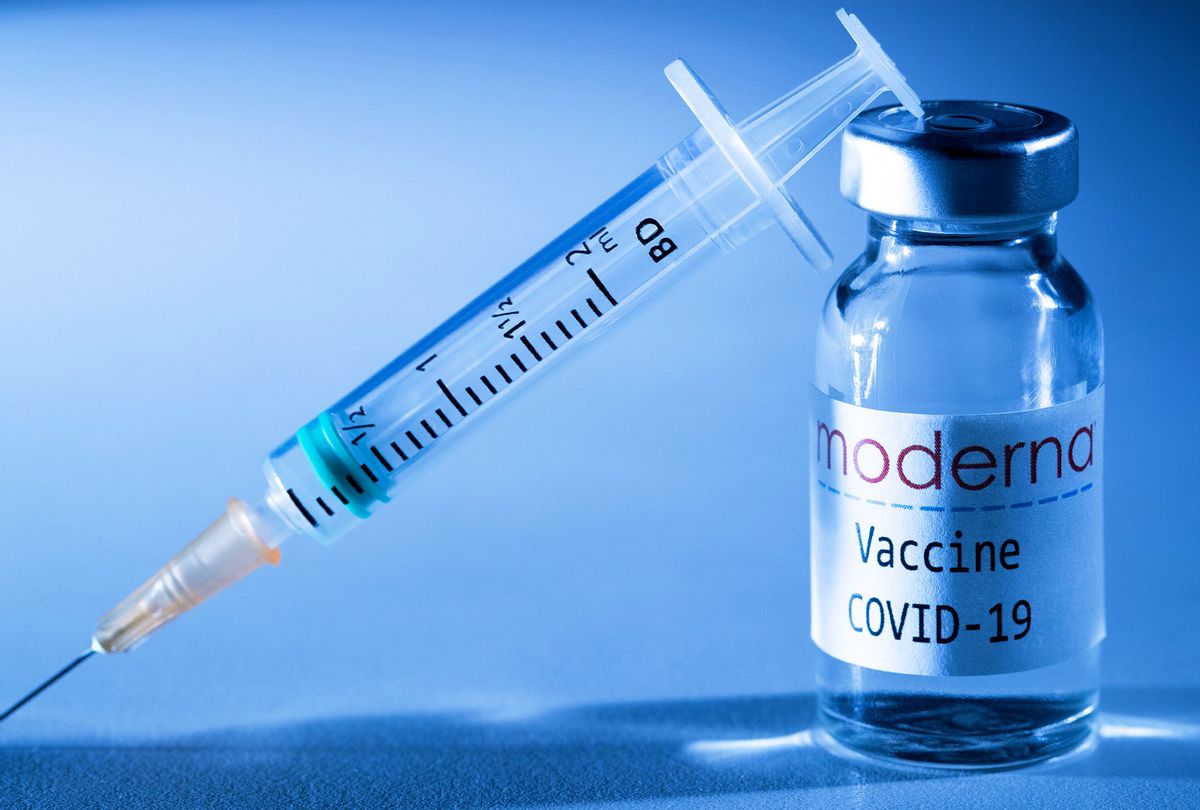On Monday, biotechnology company Moderna announced that its coronavirus vaccine candidate is 94.5 percent effective in preventing disease infection. Along with Pfizer, which made a similar announcement last week, Moderna is now the second company with a promising, well-tested vaccine candidate in the race to halt a pandemic that has killed 1.2 million people across the world.
"This is a pivotal moment in the development of our COVID-19 vaccine candidate," Stéphane Bancel, the Chief Executive Officer of Moderna, said in a statement. "This positive interim analysis from our Phase 3 study has given us the first clinical validation that our vaccine can prevent COVID-19 disease, including severe disease."
Specifically, the company announced that its vaccine candidate has 94.5 percent "vaccine efficacy." As explained by the World Health Organization, vaccine efficacy is the percentage of "reduction in disease incidence in a vaccinated group compared to an unvaccinated group under optimal conditions." This shouldn't be confused with vaccine effectiveness, which is the "ability of vaccine[s] to prevent outcomes of interest in the 'real world.'"
The results surfaced in the company's Phase 3 trial, which had 30,000 participants. Out of the study's participants, there were only five infections in patients who developed COVID-19 after receiving Moderna's vaccine. There were 95 cases of infection among patients who received the placebo in the study. (A placebo is a substance that has no effect on a patient but is administered to provide a control in pharmaceutical tests.) Previously published research regarding a Phase 1 trial found that all the participants developed neutralizing antibodies in response to two vaccinations.
>> Read more about what the different "phases" of vaccine production mean
According to the company's release, Moderna will apply for an Emergency Use Authorization (EUA) with the U.S. Food and Drug Administration (FDA) in the next few weeks.
"The primary endpoint of the Phase 3 COVE study is based on the analysis of COVID-19 cases confirmed and adjudicated starting two weeks following the second dose of vaccine," the company's statement explains. "This first interim analysis was based on 95 cases, of which 90 cases of COVID-19 were observed in the placebo group versus 5 cases observed in the mRNA-1273 group, resulting in a point estimate of vaccine efficacy of 94.5%."
All participants who received the vaccine or a placebo were over the age of 18. The trial included more than 7,000 Americans over the age of 65; more than 6,000 participants identified as Hispanic or Latinx, and more than 3,000 participants identified as Black or African American.
As Salon reported last week, Pfizer, which is developing a vaccine with a German biotechnology company called BioNTech SE, announced that its COVID-19 vaccine candidate is more than 90 percent effective at preventing infection.
So, what does this mean about when the general public can expect to have a vaccine readily available?
According to health news site Stat News, such a vaccine won't come until spring 2021 at the earliest; initially, a limited supply will be allocated to frontline workers and people with increased risks of having severe cases of COVID-19. For everyone else, spring 2021 is the earliest possible point at which a vaccine will be available. As Stat News explained:
Pfizer and Moderna expect to produce just 70 million doses of their vaccines by the end of 2020, enough for only 35 million people around the globe. In 2021, the companies could have as many as 2.3 billion doses between them, but in a pandemic-ravaged world of 7.5 billion people, that's not going to be enough to satisfy demand. Unless more Covid-19 vaccines prove to work in the coming months, the world will be rationing doses well into next year.
Similar to Pfizer, the Moderna vaccine is mRNA-based and produces antibodies against SARS-CoV-2 and T-cells that respond to the virus. This means that the mRNA, which is genetic material from the coronavirus, evokes an immune response.
While we now have a better understanding of the efficacy of the vaccine, we don't yet know the durability of the vaccine—meaning how long that vaccine lasts before the body's immune system "forgets" how to protect against the coronavirus again. Research continues to suggest that COVID-19 infection confers transient immunity in hosts, meaning that the antibodies produced after an infection only last a short while. As Salon previously reported, vaccines can confer different types of immunity than actually contracting the virus. Indeed, immunologists have noted that a vaccine could create durable immunity (meaning long-lasting) in a patient, even if the natural response to infection is transient immunity.



Shares